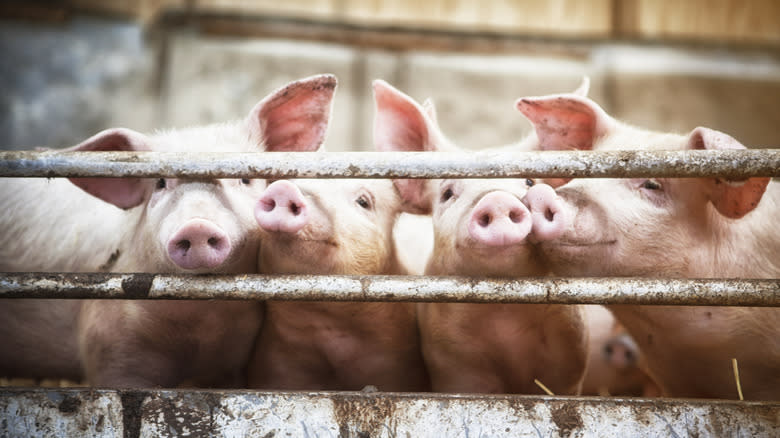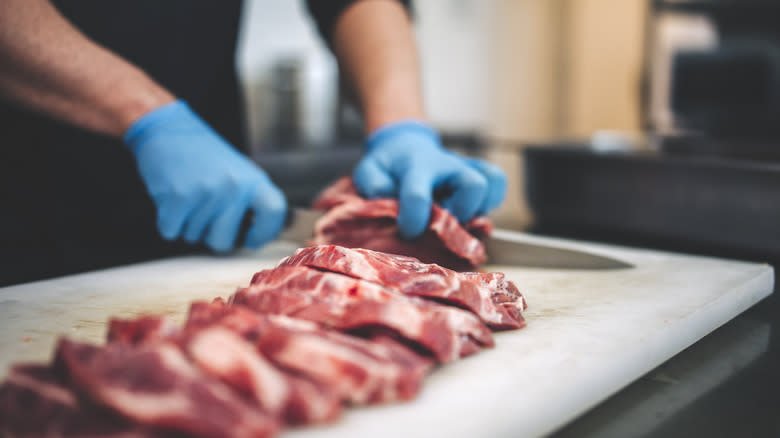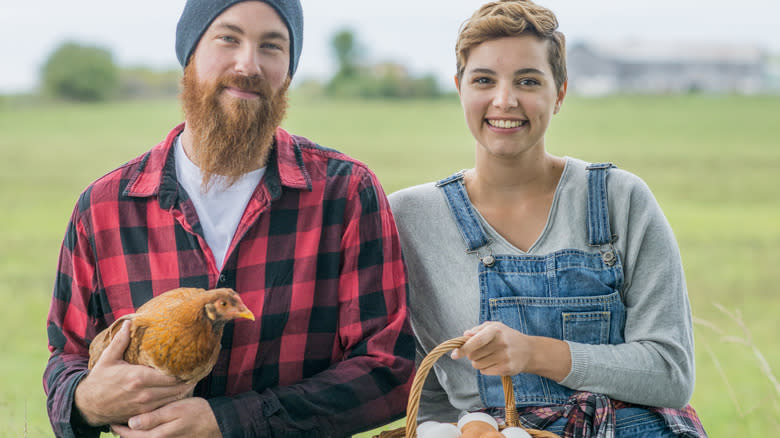The Unexpected Place To Shop For The Freshest Meat Around

Fresh meat is available in any grocery store, and it's super easy to reach for all that shrink-wrapped chicken and pork. But while shopping for supermarket meat is convenient, it's hard to get a read on how fresh it is aside from the "sell by" dates. If you want to make sure your meat is super fresh and also know where and how it was raised, try sourcing it directly from a local farmer. You can often find local meat producers at farmer's markets, and if you look around you can even get great deals (and fresher meat) if you get to know a farmer who raises animals for something other than meat, like eggs or milk.
Dairy farmers, egg farmers, and cheesemakers don't sell meat as their main source of income, but they do need to slaughter animals each season (it's a fact of life on farms). If you build a relationship with a farmer who can sell large cuts or whole animals in bulk, you'll always know exactly how fresh the meat is and how it was raised.
Read more: How To Tell If You're Eating A Cheap Vs. An Expensive Steak
How To Meet A Farmer

If you want to spark up a working relationship with a local farmer, you might not feel comfortable randomly showing up at the barn with cash in hand, so try a few other steps first if you're not feeling so bold. For starters, if you live near a small-scale butcher, chances are pretty good that they already have connections with local farmers. Support your local butcher by buying small cuts of locally-sourced meats, and pick their brains about which farms might be up for selling bulk portions. This way when you call or email the farm you'll already know that there's a good chance they'll be interested in selling to you directly.
If you don't have a local butcher, the next stop is the farmer's market. Most reasonably sized markets have at least one meat farmer, and often there's someone selling beef, another selling poultry, and so on. Don't limit yourself to just the meat farmers, either. If someone is selling eggs, for example, ask them if they butcher any chickens and if so are they able to sell whole birds. Try to get to the market early, either when it's just opening or even right before it opens. If you can catch the farmer when there aren't a lot of other people around who need their attention you'll have a much easier time talking to them about buying big cuts and visiting the farm.
Ask Questions, Buy In Bulk

If you can't make it to the farmer's market, see if you can get a list of vendors from the market director or the website to see if there are any meat sellers you can contact on your own. If those avenues aren't an option, try searching for farms using websites like The Good Meat Project, which connects small-scale local farmers with consumers looking for meat.
Once you find a farm for sourcing meat, ask lots of questions about how the animals are raised and if it is sustainable. It's also essential to come armed with an idea of how much local, small-scale meat costs so that when it's time to talk price you're not caught off guard.
When you're working directly with a farmer, they are accustomed to selling bulk amounts of meat, so be prepared to buy some big cuts or multiple birds. You can buy a portion of an animal like a whole, half, or quarter of a pig. When it's time for slaughter, you'll get your portion within a few days, which is as fresh as it gets. Just make sure you have space for all that meat in your chest freezer.
Read the original article on Daily Meal.

